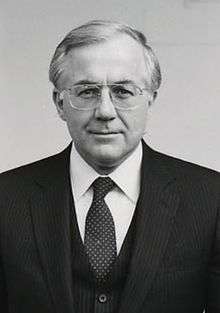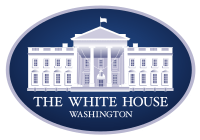Richard V. Allen
Richard Vincent Allen (born January 1, 1936)[1] was the United States National Security Advisor to President Ronald Reagan from 1981 to 1982, having been Reagan's chief foreign policy advisor from 1977. He has been a fellow of the Hoover Institution since 1983.[2] He is a past member of the Defense Policy Board Advisory Committee.
Richard V. Allen | |
|---|---|
 | |
| 11th United States National Security Advisor | |
| In office January 21, 1981 – January 4, 1982 | |
| President | Ronald Reagan |
| Preceded by | Zbigniew Brzezinski |
| Succeeded by | William Clark |
| 5th United States Deputy National Security Advisor | |
| In office 1969 | |
| President | Richard Nixon |
| Preceded by | Francis M. Bator |
| Succeeded by | Alexander Haig |
| Personal details | |
| Born | Richard Vincent Allen January 1, 1936 Collingswood, New Jersey, U.S. |
| Political party | Republican |
| Education | University of Notre Dame (BA, MA) |
Background
Allen was born in 1936 in Collingswood, New Jersey.[1][3] A graduate of Saint Francis Preparatory School in Spring Grove, Pennsylvania, Allen received his B.A. and M.A. degrees from the University of Notre Dame.[4] His M.A. from Notre Dame is in political science.[2]
Career
Allen worked at the Center for Strategic and International Studies from 1962 to 1966.[1] He was then a senior staff member of the Hoover Institution from 1966 to 1968, leaving to become foreign policy coordinator to Richard Nixon, and serving twice in the Nixon White House.[2] He was then Ronald Reagan's chief foreign policy advisor from 1977 to 1980, before being appointed as Reagan's first National Security Advisor.[2]
Allen wrote an article in the NYT detailed his role in the recruitment of George H.W. Bush to be Reagan's vice president.
National Security Advisor (1981–82)
In November 1981, while serving as Reagan's National Security Advisor, Allen was accused of receiving a bribe from a journalist from Japan for setting up an interview in January 1981 with First Lady Nancy Reagan. Ronald Reagan said, in his diary, that the Japanese magazine gave cash gifts to people that it interviewed, and that Allen had stepped in to intercept the check to avoid embarrassment for Nancy Reagan, then gave the check to his secretary, who put it in an office safe. Then when Allen changed offices, the check was found left in the safe. The FBI cleared everyone involved, then the Justice Department began its own investigation, and the story got leaked to the press. Reagan believed it was just political sabotage behind leaking the story. A classified US government source later revealed that Allen and his Potomac Associates partners were caught soliciting bribes/"consulting fees" from Japanese corporations. Japanese security operations reported the crime to the US Embassy in Tokyo and requested the US government quietly handle the removal.[5] Although the claims were never proven, Allen was eventually pressed into taking a leave of absence,[6] and ultimately resigning his position on January 4, 1982.[1]
Also in 1981 Richard Allen said that an unidentified third country (possibly Canada) had passed on an offer of 50 Vietnam War POWs in return for $4 billion. In lengthy, closed-door testimony under oath to committee investigators on June 23, 1992, he generally confirmed Hanoi's 1981 offer. Allen was asked by a committee staffer, "Soon after taking office, did the Reagan administration become involved in an offer made by the Vietnamese government for the return of live prisoners of war, if you can recall?"
He responded, "This $4 billion figure sticks in my mind, and I remember writing something — I don't know whether it was during a meeting with the president or to him — saying that it would be worth the president's going along and let's have the negotiation…"
Then Allen was asked, "Do you recall whether the $4 billion was for live American prisoners? To which he replied, "Yes, I do if it was $4 billion, it was indeed for live prisoners." He later recanted and no other official has supported the statement in public.[7]
Later career
He is currently a senior fellow at Stanford University's Hoover Institution, and a member of The Heritage Foundation's Asian Studies Center Advisory Council, the Council on Foreign Relations, the United States Defense Policy Board, the American Alternative Foundation, and the United States National Security Advisory Group. He also serves on the advisory council of the Nixon Center.
Allen is president of the Richard V. Allen Company, a Washington-based consulting services firm. He provides consulting services to international companies and organizations. He currently serves on APCO Worldwide's Iraq reconstruction task force and is considered one of the most influential lobbyists in Washington for South Korean interests.[8]
Richard Allen is also a fellow of St Margaret's College, Otago, one of New Zealand's most prestigious residential colleges.[9]
Bibliography
- Allen, Richard V. (1966). Peace and Peaceful Coexistence. Chicago: American Bar Association, 1966.
- Allen, Richard V. (1967). Communism and Democracy: Theory and Action. Princeton: Van Nostrand, 1967.
- Allen, Richard V. (1969). Yearbook On International Communist Affairs 1968. Hoover Institution Press. ISBN 0-8179-1801-9.
Filmography
- Die Hard with a Vengeance (1995) - Chief Allen
- Killing Reagan (film), 2016
References
- Peter B. Levy (1996), Encyclopedia of the Reagan-Bush Years, ABC-CLIO, p16
- Hoover Institution, Richard V. Allen
- socialarchive.iath.virginia.edu, Allen, Richard V. OAC
- http://www.isi.org/bios/bio.aspx?id=F85FFF32-2837-478A-BF39-13618AFA7720&..
- Reagan, Ronald. edited by Douglas Brinkley The Reagan Diaries 2007. New York: HarperCollins. ISBN 978-0-06-087600-5
- Raines, Howell (January 5, 1982). "Allen Quits Security Post; Reagan Hails His 'Integrity'; Haig's Deputy Is Successor". The New York Times. ISSN 0362-4331. Retrieved April 25, 2020.
- http://www.theamericanconservative.com/articles/gareth-porter/
- APCO @ PR Firms.org
- http://stmargarets.ac.nz/People/Fellows/tabid/157/language/en-GB/Default.aspx
External links
- Statement of Richard Allen before the Subcommittee on Terrorism and Homeland Security of the House Permanent Select Committee on Intelligence, October 11, 2001.
- Letter to President Bush on the War on Terrorism, signed by Richard V. Allen, September 20, 2001.
- Appearances on C-SPAN
- Interview with Miller Center of Public Affairs – Presidential Oral History Program
- Richard Allen
| Political offices | ||
|---|---|---|
| Preceded by Francis Bator |
Deputy National Security Advisor 1969 |
Succeeded by Alexander Haig |
| Preceded by Zbigniew Brzezinski |
National Security Advisor 1981–1982 |
Succeeded by William Clark |
